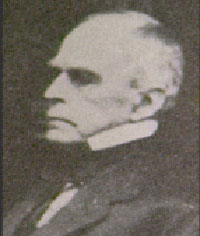 In 1819, while a member of the House of Delegates, he married into a prominent Albemarle County family, and the couple moved to property near Charlottesville. From his new Albemarle base, Rives continued to be politically active.
In 1819, while a member of the House of Delegates, he married into a prominent Albemarle County family, and the couple moved to property near Charlottesville. From his new Albemarle base, Rives continued to be politically active.
William C. Rives (1793-1868)
William Cabal Rives was born in 1793, in Virginia, and educated at Hampden-Sidney College and the College of William and Mary. He studied law and politics from Thomas Jefferson, served in the War of 1812, and, after the war, became a state representative.
 In 1819, while a member of the House of Delegates, he married into a prominent Albemarle County family, and the couple moved to property near Charlottesville. From his new Albemarle base, Rives continued to be politically active.
In 1819, while a member of the House of Delegates, he married into a prominent Albemarle County family, and the couple moved to property near Charlottesville. From his new Albemarle base, Rives continued to be politically active.
He served again in the House of Delegates and, from 1823 to 1829, in the United States Congress. As a member of the so-called Richmond Junto, Rives supported Andrew Jackson, and the new president appointed him minister to France, where he concluded an important indemnity treaty.
Returning to the United States, Rives entered the Senate in 1832. He supported Jackson's attack on the national bank and his nullification policy. However, late in Jackson's presidency, and during the following Van Buren administration, Rives opposed the Democratic party's drift towards a hard-money currency and its attacks on state banks. He became a leader of the "Conservatives," an independent faction associated formally with neither the Democratic nor Whig parties. More and more, however, Rives acted with the Whig party, and it was with Whig support that he returned to the Senate in 1841, after his previous term had expired in 1839. He supported William Henry Harrison for President in 1840, was closely associated with Henry Clay, and finally became a full-fledged Whig in 1844, when he supported Clay's presidential bid.
After his Senate term expired in 1845, Rives returned to private life for several years before serving again, from 1849-1853, as minister to France. It is likely that the civil unrest in France during that period influenced him to seek a peaceful resolution of his own country's sectional problems following his return to the United States. In 1861, he was a member of the Peace Convention which met in Washington, as well as a member of the Virginia convention, called to decide the state's course on secession. He opposed secession, but warned that Virginia would join the Confederacy if the federal government attempted to coerce the seceded states.
After the firing on Fort Sumter, Virginia joined the Confederacy, and Rives sat as a member of the Confederate government until poor health forced him to resign in 1862.
He died a few years after the end of the war, in 1868.